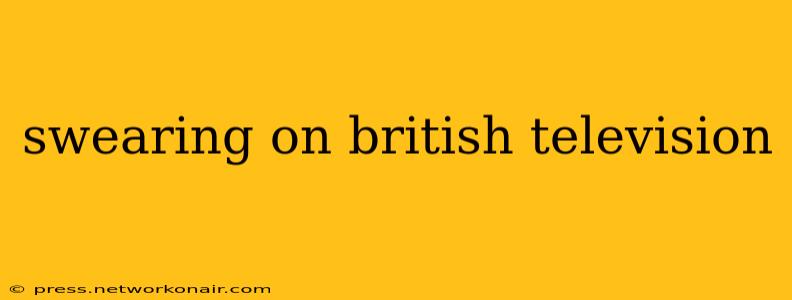British television, known for its wit and sometimes edgy humor, has a complex relationship with swearing. While not as permissive as some other countries, the UK's broadcasting landscape allows for a certain level of profanity, depending on the time of day and the target audience. This guide delves into the rules, regulations, and the evolution of swearing on British television.
What are the rules regarding swearing on British television?
The broadcasting regulator, Ofcom, sets the standards for acceptable language on television. These standards are not about banning swear words outright, but rather about considering the context, the time of broadcast, and the potential impact on viewers. Generally, stronger language is less acceptable during daytime hours when children are more likely to be watching. Programs aimed at a younger audience will naturally have stricter guidelines. The key is responsible broadcasting – ensuring that any use of offensive language is justified within the narrative and doesn't gratuitously shock or offend. Ofcom's rulings are based on a case-by-case basis, examining viewer complaints and the specific context of the broadcast.
How has the use of swearing on British TV changed over time?
The acceptance of swearing on British television has evolved significantly over the years. In the early days of television, even mild expletives were largely absent. As societal attitudes shifted, and programming became more diverse and realistic, a gradual increase in the use of stronger language occurred. The rise of channels specifically targeting adult audiences, coupled with the increasing popularity of more realistic and gritty dramas, significantly contributed to this change. However, this evolution has not been without its controversies, with Ofcom receiving complaints about certain programs and their use of swear words.
What are the consequences of broadcasting unacceptable language?
If Ofcom finds a broadcast to have breached its standards, it can impose various sanctions. These sanctions can range from a simple warning to substantial fines, depending on the severity of the offense. In extreme cases, Ofcom could even revoke a broadcaster's license. The consequences are also reputational; broadcasters are keen to avoid controversy and maintain a positive public image.
Which TV shows are known for pushing the boundaries of acceptable language?
Several British television shows have gained notoriety for their liberal use of swear words, often as a key component of their comedic style or dramatic realism. Shows like Peaky Blinders, with its intense period setting and morally gray characters, or comedies like The Inbetweeners, utilizing strong language as part of their teen humor, exemplify this. It's important to note, however, that even in these shows, the use of swear words is usually carefully considered to fit within the narrative and character development.
Does the type of program affect the acceptable level of swearing?
Absolutely. The type of program is a crucial factor in determining the acceptable level of swearing. A family-friendly cartoon will have almost zero tolerance for profanity, while a late-night adult drama might have a much higher threshold. This distinction reflects the understanding that different programs are aimed at different audiences and therefore have different responsibilities to protect viewers.
How does the British approach to swearing on television compare to other countries?
Compared to some countries, Britain sits somewhere in the middle of the spectrum. Some countries have much stricter regulations, while others are significantly more permissive. The approach often reflects cultural norms and societal attitudes towards language and broadcasting. The UK attempts to strike a balance between protecting viewers (particularly children) and allowing for creative expression.
Conclusion
The regulation of swearing on British television is a constantly evolving process, reflecting changes in societal attitudes and broadcasting technology. While the use of strong language has increased over time, it remains subject to scrutiny and regulation. Ofcom's role is crucial in balancing creative freedom with the need to protect viewers, ensuring a broadcasting landscape that is both engaging and responsible.

